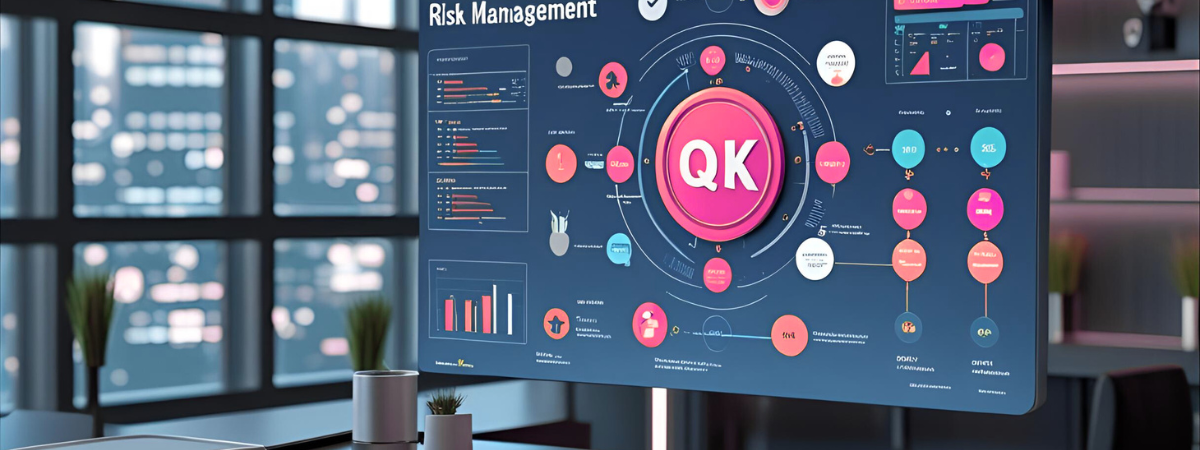

Supplier Risk Management Explained: What It Is And How To Stay In Control
You can’t deliver without trustworthy suppliers. That’s why building trust into your supply chain matters. Knowing who your suppliers are, how they operate, and where the risks sit allows you to make informed decisions, protect your operations, and deliver with confidence.
You can’t deliver without trustworthy suppliers. That’s why building trust into your supply chain matters. Knowing who your suppliers are, how they operate, and where the risks sit allows you to make informed decisions, protect your operations, and deliver with confidence.

Sections
- Why supplier risk management is critical for your business
- What is supplier risk management?
- What are the types of supplier risk?
- Why is risk management important?
- What are the primary concerns for a supplier?
- How do you manage risk with suppliers?
- What are the 5 risk management approaches?
- How do you assess supplier risk?
- How to conduct a supplier risk assessment?
- Why implement a strategic risk management strategy?
- How do you mitigate supplier risk?
- What is supply risk in procurement?
- Future Trends in Supplier Risk (2025+)
- Wrapping up: Stay ahead with strong supplier risk management
- How JOSCAR helps reduce supplier risk
- What to do next
Why supplier risk management is critical for your business
When a supplier drops the ball, it’s your reputation, and revenue, on the line. That’s why supplier risk management is essential.
It’s not just about ticking boxes. It’s about making sure your business keeps running, no matter what. Supplier risk management helps you spot problems early, make informed decisions, and keep your operations moving.
This guide is here to help you get a handle on it. Whether you're in defence, aerospace, infrastructure, or just managing a complex supply chain - you’ll find practical steps, useful tools, and clear answers.
What is supplier risk management?
Supplier risk management is how you protect your business from disruptions caused by third parties.
It’s a simple process:
-
Spot risks.
-
Score them.
-
Act before they hurt you.
When done right, you avoid delays, compliance issues, and unexpected costs. And you gain the confidence to grow.
According to the Business Continuity Institute, nearly 80% of organisations experienced supply chain disruption during the past 12 months - with nearly half tied to failures beyond the first tier. This underscores why strong supplier risk management is now a critical, non‑negotiable business practice.
Want a deep dive into supplier risk management?
What Is Supplier Risk Management? A Plain-English Explanation for Procurement Teams
What are the types of supplier risk?
You’re exposed to risk in more ways than one. Here are the big five:
-
Financial risk – suppliers who may not stay afloat.
-
Operational risk – breakdowns that disrupt supply.
-
Geopolitical risk – global issues outside your control.
-
Cybersecurity risk – vulnerabilities in their tech that affect yours.
-
ESG/compliance risk – failures in ethics, safety, or sustainability.
Explore our full breakdown in What Are the Types of Supplier Risk? A Breakdown with Examples
Why is risk management important?
If you rely on suppliers, you rely on their stability. When things go wrong, the fallout hits your cost, reputation, compliance and customers.
According to Gartner, a staggering 89% of companies experienced a supplier risk event in the past five years - and nearly two-thirds were slow to respond because they lacked a continuous framework to predict, assess, and manage supplier risk.
And PwC reports that 43% of executives now list supply chain risk among their top concerns for company growth - supporting that supplier risk isn’t just a procurement problem, it’s a strategic imperative.
For a deeper look at the most pressing concerns facing suppliers right now, read Top Concerns for Suppliers in Today’s Risk-Heavy Markets
What are the primary concerns for a supplier?
Suppliers face their own risks - and these can have a direct impact on your business. Understanding their top concerns is a key part of effective supplier risk management and helps you make more informed decisions during a supplier risk assessment.
Here are the most common supplier risks they’re navigating:
-
Tight delivery timelines
-
Quality expectations
-
Regulation and audit pressure
-
Data security requirements
-
Changing demand
These concerns directly impact how they perform for you, and how much risk they carry into your supply chain.
Want to see what’s keeping your suppliers up at night?
Explore What Your Suppliers Are Thinking
How do you manage risk with suppliers?
Managing supplier risk doesn’t have to be complex. Here’s a clear five-step process:
-
Identify key suppliers
-
Categorise risks
-
Score each risk using a matrix
-
Monitor performance using real-time data
-
Mitigate and review regularly
Whether you're building your process from scratch or refining what you already have, clarity is key.
Want a closer look at how to do each step well?
Read the Full Guide to Managing Supplier Risk
What are the 5 risk management approaches?
There are five smart ways to deal with supplier risk, depending on the type of risk and the impact it could have on your business.
These approaches are the foundation of any strong supplier risk management strategy:
-
Avoid it – walk away from high-risk suppliers.
-
Reduce it – improve controls or offer support.
-
Transfer it – use contracts or insurance.
-
Accept it – for low-impact risks.
-
Share it – collaborate on risk solutions.
Each method plays a role in helping you protect your supply chain and prioritise resources where they matter most.
Need help deciding which approach to use?
Choose the Right Supplier Risk Management Approach
How do you assess supplier risk?
If you want to reduce disruption, you need to regularly assess supplier risk - and that starts with the right information.
Here are the essentials to include in any supplier risk assessment:
-
Financial reports
-
Insurance & compliance checks
-
Cybersecurity audits
-
ESG track record
-
Onsite visits or remote assessments
By checking these areas, you get a clear view of where risk might be hiding and where to focus your attention.
Need a step-by-step guide to get started?
Build Your Own Supplier Risk Assessment Checklist
How to conduct a supplier risk assessment?
Running a clear, repeatable supplier risk assessment helps you stay proactive and protect your operations. The key is keeping the process simple and consistent.
Here’s how to assess supplier risk step by step:
-
List your suppliers
-
Gather the right data
-
Sort risks into categories
-
Score the risks
-
Prioritise follow-up
-
Track changes over time
Want a full walkthrough with practical tips?
See How to Assess Supplier Risk Step-by-Step
Why implement a strategic risk management strategy?
If you manage supplier risk reactively, you’re always playing catch-up. A strategic risk management approach gives you the structure and foresight to handle risks before they turn into problems.
Here’s what strategic supplier risk management helps you do:
-
Take control early
-
Align with wider business goals
-
Pass audits with ease
-
Focus on performance, not just problems
It’s not just about compliance, it’s about building a more resilient, future-ready supply chain.
Want to build your own supplier risk strategy from the ground up?
Get Our Strategic Supplier Risk Management Toolkit
How do you mitigate supplier risk?
Once you’ve identified the risk, the next step is action. The goal of any supplier risk management process is to mitigate supplier risk before it disrupts your operations.
Here are some practical risk reduction strategies that work:
-
Have backups in place
-
Segment suppliers by risk level
-
Audit and monitor regularly
-
Set clear contracts and KPIs
These steps help reduce the impact of supplier issues - and keep your business running smoothly.
Explore proven supplier risk reduction strategies.
What is supply risk in procurement?
Supply risk in procurement is the chance that something - internal or external - will interrupt your ability to source what you need, when you need it.
This could be a supplier failure, a regulatory issue, a sudden market shift, or even an internal delay. No matter where it starts, procurement risk can ripple across your entire operation.
Understanding and managing these risks is a core part of strong procurement risk management.
See how procurement risk fits into your wider supply chain strategy.
Future Trends in Supplier Risk (2025+)
Forward-looking organisations should prepare for:
-
AI tools that detect risk early
-
Blockchain to verify credentials
-
ESG metrics built into sourcing
-
Real-time dashboards across the supply chain
As global supply chains grow more complex and interconnected, staying ahead of these shifts is crucial for long-term resilience and competitive advantage.
See what’s coming and how procurement can stay ahead with Future Trends in Supplier Risk.
To explore the most impactful innovations and disruptions shaping the next five years, from AI tariffs and trade regulations, read Deloitte's 2026 Aerospace and Defense Industry Outlook.
Wrapping up: Stay ahead with strong supplier risk management
Supplier risk management isn’t a one-off checklist. It’s a long-term strategy to keep your business safe, compliant, and resilient.
Let’s recap:
-
Supplier risks come in many forms -financial, operational, cybersecurity, and more.
-
Knowing how to assess, score, and manage those risks helps you stay in control.
-
The right tools and templates make the process easier and repeatable.
How JOSCAR helps reduce supplier risk
Let’s face it, managing supplier risk can feel overwhelming. You’re under pressure to deliver, and you need partners you can count on. That’s where JOSCAR comes in.
JOSCAR is a trusted platform used by major organisations in defence, aerospace, and security. It helps you quickly find suppliers who meet the highest standards - without wasting time chasing paperwork or repeating the same checks.z
What to do next
- See how JOSCAR simplifies supplier risk management
- See how BAE Systems use JOSCAR to get visibilty of Scope 3
- Learn more about JOSCAR in the UK
- Learn more about JOSCAR in Australia
When risk is high, clarity wins. JOSCAR helps you cut through the noise, stay compliant, and build a more resilient supply chain - with less effort and stronger supplier risk management at the core.
Ready to take action?
Related Resources
Want to keep learning?
Explore more resources below, check out our FAQs, or bookmark this page. We update it regularly to stay ahead of new trends in supplier risk.




